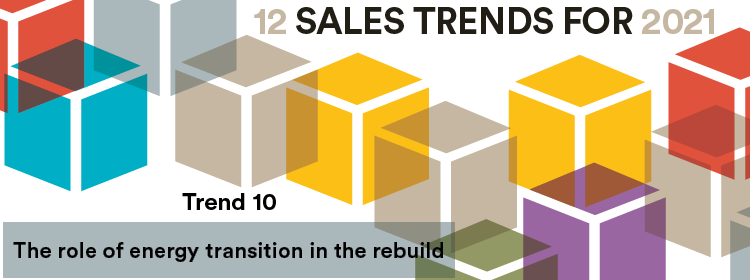
Sales trend 10 from the 12 Sales Trends for 2021 Report highlights the opportunities for businesses in energy transition and efficiency.
By guest author Alison Rowe, former CEO – Australian Energy Foundation, helping businesses and communities transition to clean energy and a more sustainable future.
 Business in 2020 got to see what previously was unthinkable, what life looks like when no-one is permitted onsite at a workplace or what a dramatically pared back team looks like to meet social distancing measures.
Business in 2020 got to see what previously was unthinkable, what life looks like when no-one is permitted onsite at a workplace or what a dramatically pared back team looks like to meet social distancing measures.
As we all struggled with the transition into COVID-19 pandemic-lead lockdowns, working from home became the norm for many. With most people around the country experiencing some form of change from the workplace we travel to daily to a workplace at home, residential energy use in Victorian households increased dramatically to 41% more during the week of the 5th May in 2020 compared to the same time in 2019, while energy use for SMEs only decreased at best by 28% the week of the 16th April 2020 but generally hovering around 15% lower than in 2019[1].
These energy use figures present a disconnect from the prediction that energy consumption for businesses would go down dramatically as teams shifted to work-from-home environments. It also raises a question around who should be paying for the energy used when people work from home: employees or the business?
In what we hope is a rare situation in 2020, it has highlighted missing and weak energy policy, such as minimum energy star ratings for buildings, which would have helped a lot of businesses reduce their energy costs while workspaces were empty and largely unused. In the absence of these minimum standards for all properties (including rentals), 2021 provides a unique opportunity for businesses to take up government rebates and grants to invest in their financial and environmental sustainability and undertake energy efficiency upgrades, implement energy management measures, and replace and install appliances, such as:
- Insulation
- Highly energy efficient reverse cycle air conditioners
- Hot water heat pumps
- Draft proofing and carbon monoxide testing and/or decommissioning
- Highly energy efficient appliances and white goods
- Curtains
- Window film Blinds
- Solar and battery storage
More broadly in the energy sector, opportunities will arise in 2021 in the areas of renewable energy component manufacturing, focusing on embedding into the circular economy. Further development will occur on what exportation of renewables from Australia across the world can look like, as well as a reimagining of the auto industry in Australia with the manufacture of electric vehicles.
Businesses looking to transition to clean energy will take steps in 2021 to actively engage in their energy management, looking towards peer-to-peer energy sharing and trading models plus behind-the-meter solutions with energy storage, between business who are generating their own clean energy and then sharing it with business who want clean energy but do not have the means to generate it onsite. Business will even take up innovative cooling options including using recycled water in their heating and cooling systems.
Energy efficiency
The main opportunities occur for businesses in two main areas:
The energy consumption of the building you run your business from: there are huge opportunities here for those who own the property or have the ability to undertake a significant energy efficiency retrofit using the solutions mentioned before in conjunction with applicable government rebates and grants.
Retrofits are really a perfect opportunity to reduce the energy consumption required to heat or cool your workspace. In addition, it has the benefit of improving the thermal comfort, health and wellbeing implications for staff who work in the space, when considerations around appropriate ventilation, sunlight levels and even plants are brought into the retrofit mix[2]. In our experience, workplaces that are thermally comfortable tend to have better staff retention rates and less sick days accrued.
The amount of energy required to produce the goods and services that are at the core of your business: an area for business to impact their energy efficiency significantly and positively, it is around ensuring the appliances and technology used to produce goods and support the delivery of services are as energy efficient as possible. The main benefit here is reduced energy bills, leading to decreased overheads, due to increasing amounts of renewable energy generation, which reduces energy production costs and cleans up Australia’s energy supply chain – especially significant as the cost of fossil fuel-based energy continues to increase in the meantime.
The annual increases in costs to purchase energy from the grid will continue to enable more investment in energy efficiency upgrades and retrofits to workplaces, appliances, and technology, improving the cost/benefit balance tilt towards low and no-energy use technologies. Buildings incorporating passive design[3], aim to stop using mechanical technology powered by fossil fuels for heating and cooling purposes, and hence bring the ongoing costs of working in and using a space to negligible levels.
Rebuilding with clean energy
We foresee that 2021 will see businesses increase focus on reducing daily energy use overheads, underpinned by government support at all levels with grants and rebates for solar, batteries, EVs and other energy management technologies to bolster efficiencies and boost job numbers and the economy out of the COVID-19 downturn.
Now is the ideal time to take advantage of these government programs and support to invest in your businesses’ future and benefit from reduced ongoing costs of operation and increased health and wellbeing of your staff and customers.
[1] Source: VIC DNSPs weekly energy consumption to week ending 7 August 2020
[2] Brickworks Living Building Challenge https://living-future.org.au/the-brickworks-living-building-challenge-design-competition/
[3] Australian Passive House Association https://passivehouseaustralia.org/
Related topics
12 Sales Trends for 2021 – The rebuild
No, but actually… the time is now
Want a viable future? Opportunities abound in the Common Good
A year ago
How a Sales Process helps your sales team sell better, faster
Four years ago
Don’t die wondering, the real secret to sales success – Part II of II: the person


New Article Email Notification